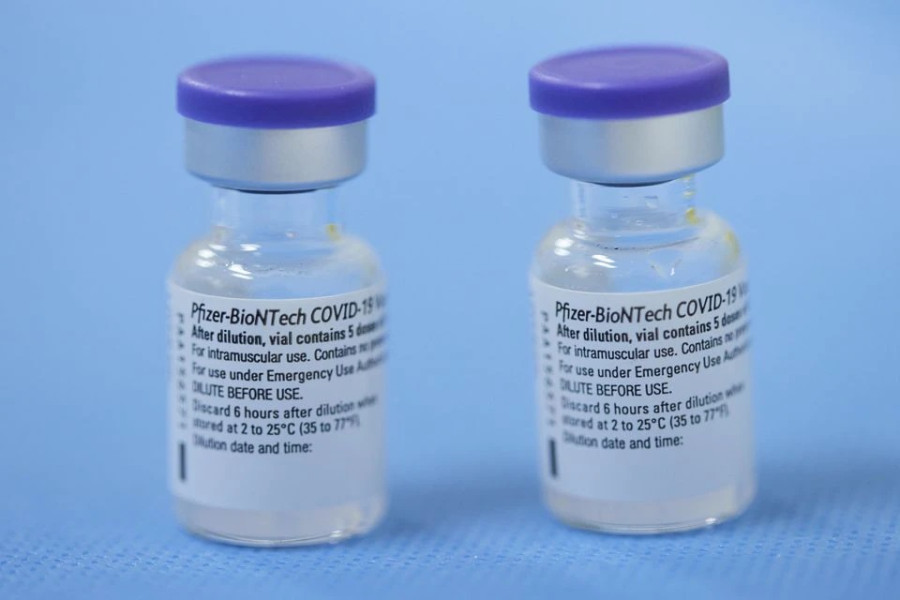Health
Nepal all set to receive 100,000 doses of Pfizer’s Covid-19 vaccine from Covax
Officials say they are close to a deal to purchase another 6 million doses of the vaccine.
Arjun Poudel
After it became certain that Covax would deliver the Pfizer-BioNtech Covid-19 vaccine to Nepal, authorities have started necessary preparations for storing and rolling out the vaccine.
Agencies under the Ministry of Health and Population have started setting up storage facilities, preparing guidelines and training manuals for immunisation workers, and started selecting priority groups for vaccination.
“Covax has confirmed that it is delivering over 100,000 doses of Pfizer-BioNtech,” Sagar Dahal, chief of National Immunisation Programme, told the Post. “Covax will deliver the vaccine doses once our preparations are over.”
Covax, a UN-backed vaccine-sharing scheme, has committed to provide Nepal around 13 million doses of Covid-19 vaccines, which will be sufficient for 20 percent of the total population.
After a request by the Department of Health Services, the Department of Drug Administration, which is the national regulatory body of the drugs market, has given emergency use authorisation for the Pfizer-BioNtech Covid-19 vaccine. Normally, the vaccine manufacturer makes such a request.
“Yes we have given emergency use authorisation for the Pfizer-BioNtech Covid-19 vaccine,” Santosh KC, spokesperson for the Department of Drug administration, told the Post. “Instead of the vaccine manufacturing company or its supplier, the Department of Health Services made the request.”
Earlier also, the national drug regulator had given emergency use authorisation for the Johnson & Johnson’s Janssen vaccine and AstraZeneca’s Covid-19 vaccine on its own, by amending the emergency use authorisation rules.
The Pfizer-BioNtech Covid-19 vaccine will be the first mRNA-based Covid-19 vaccine to be used in Nepal. The vaccine developed jointly by the US-based Pfizer and the German firm Biontech, uses a copy of a molecule called messenger RNA(mRNA) to produce the immune response.
It is said that the Pfizer-BioNtech Covid-19 vaccine was 95 percent effective at preventing laboratory-confirmed infection with the virus that causes Covid-19 in people who received two doses and has no evidence of being previously infected.
According to the US Centers for Disease Control and Prevention, the Pfizer-BioNTech vaccine was also highly effective at preventing laboratory-confirmed Covid-19 infection in adolescents 12–15 years old, and the immune response in people 12–15 years old was at least as strong as the immune response in people 16–25 years old in clinical trials.
“Evidence shows mRNA Covid-19 vaccines offer similar protection in real-world conditions as they have in clinical trial settings―reducing the risk of Covid-19, including severe illness by 90 percent or more, among people who are fully vaccinated,” the US Centers for Disease Control and Prevention said on its website.
The vaccine needs to be stored in minus 70 degrees Celsius, which is not supported by Nepal’s existing vaccine storage facilities.
“Covax facility has provided us with four ultra cold freezers to store the Pfizer-BioNtech Covid-19 vaccine,” Upendra Dhungana, chief of the Logistic Management Section under the Department of Health Services, told the Post. “We have been working to set up the freezers in the central storage at Teku.”
The four freezers can store over 100,000 doses, according to Dhungana.
Meanwhile, an official at the Health Ministry said they are working to clinch a deal with the vaccine manufacturing company (Pfizer-BioNTech) to purchase 6 million doses of the vaccine.
“We have held a few rounds of talks and the vaccine manufacturing company is positive about supplying the vaccine but no deal has been reached yet,” a senior official at the Health Ministry, told the Post, asking not to be named.
When asked if the existing vaccine storage can store the 6 million doses of the Pfizer-BioNTech vaccine if the manufacturer supplied, the official said the ministry would make all necessary preparations for storing the vaccine.
The Health Ministry also said that preparations have been completed to bring 4.4 million doses of Vero Cell vaccine from China.
“Within this week, we will bring the vaccine from China,” said Dahal, chief of the National Immunisation Programme. “Once China's aviation authority gives the flight permit, our plane will bring the vaccine.”
Nepal so far has received a total of 13,357,590 doses of Covid-19 vaccines. Of them, 4,422,740 doses were AstraZeneca type vaccines, 7,400,000 doses were Vero Cell, and 1,534,850 doses were the Janssen vaccine produced by Johnson & Johnson.
Of the 4,422,740 doses of the AstraZeneca type vaccine, 2,448,000 doses were Covishield, manufactured in India. India had provided 1.1 million doses under grant assistance. Of the 2 million doses of the Covishield vaccine Nepal purchased from the Serum Institute of India in February, only 1 million doses have been delivered.
Besides this, Covax had supplied 348,000 doses of the Covishield vaccine.
Bhutan supplied 230,000 doses and Japan provided 1,614,740 doses of the AstraZeneca type vaccine. A few weeks ago, the United Kingdom provided 130,000 doses of the AstraZeneca type vaccine.
China has so far supplied 7.4 million doses of the Vero Cell vaccine.
Apart from this the United States had supplied 1,534,850 doses of the single-shot Janssen vaccine.
The government has already paid for 4 million doses of Moderna’s Covid-19 vaccine through the World Bank to the US manufacturer, and delivery is expected by mid-February.




 17.9°C Kathmandu
17.9°C Kathmandu















